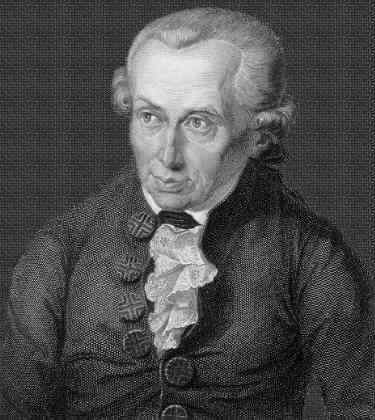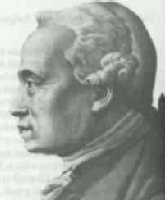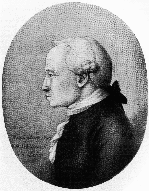|
|
|

"…two things fill the mind with ever new and increasing
admiration and awe… the starry heavens above and the moral law within."

Name: Immanuel Kant (1724-1804)
Birthplace: Kšnigsberg (Kaliningrad) in East Prussia
Works:
Universal Natural History And Theory On The
Heavens (1755)
Dreams of A Spirit-Seer (1766)
Inaugural Dissertation (1770)
The Critique of Pure Reason (1781).
Fundamental Principles of the Metaphysic of
Morals (1785)
Critique of Practical Reason (1788)
Critique of Judgment (1790)
Metaphysical Foundations of Natural Science
(1786)
Religion within the Bounds of Reason Alone
(1793)
Perpetual Peace (1795)
Introduction to the Metaphysics of Morals
(1797), often translated in two
parts: The Metaphysical Principles of Right
and Metaphysical Principles of
Virtue.
The Metaphysical Elements of Ethics
The Science of Right
Shortly before his death Kant took time to
begin a revisal of his views
on metaphysics and philosophy resutling in
Opus
Postumum which was
revised and published after Kant's death.
 Biography
Biography
Kant was born to a saddler and was educated in the town of his birth. After Finishing University (1740-46) Kant took up to private tutoring before taking his Master's Degree and settling to teach at Privatdozent in 1755. In 1770 he was appointed to the chair of logic and metaphysics at his home town Kšnigsberg. Kant finally retired from teaching at the University in 1796. Kant never married or Traveled out of East Prussia. Kant was a well liked and respected figure in his society with a wide circle of colleagues and friends.
Kant's Philosophy
First lets start by defining philosophy in Kant's Terms
"Philosophy, according to Kant, is the outcome of the use of human reason, which undertakes investigations a priori, or independently of experience... Thus the two main branches of philosophy are metaphysics , the investigation a priori of the nature of reality, and ethics , which seeks a priori for rules governing the way in which beings with free will ought to decide what to do. "
The Philosophies of Kant are divided into 3 significant periods as found below:
The "pre-critical period" (1747-1770)
This period in Kant's writing consisted of significant shifts in views although it is uniformly grouped in Kant's philosophy dealing with foundational questions in science and searching for a proper method when dealing with Metaphysics.
The "silent decade" (1771-1780)
Called the silent decade, this period saw very little published works from Kant. Kant dedicated himself to study and reflection which later resulted in the Critique of Pure reason.
"Time was, when she (metaphysics) was the queen of all the sciences; and, if we take the will for the deed, she certainly deserves, so far as regards the high importance of her object-matter, this title of honour." - Immanuel Kant Preface to Critique of Pure Reason
Critique of Pure Reason Is one of Kant's most widely read and known
book acclaimed to be his greatest work and from it a bases of philosophy
can be formed.
of which "metaphysics purports to provide necessary truths, which,
as such, cannot be based on empirical evidence"
The critical period (1781-end)
Kant published many works in this time and it is now that he expresses his many reasons on the bases of the idea of dealing with the dealing with truths known by all such as the existence of things that cannot be proved by empirical evidence but are universally realized. As well as the dealing with the fact that "reason inevitably falls into contradiction with itself when it endeavors to 'think the whole'" AN example of this is the both provable theories of the universe one that it has a beginning, and the other that it has existed for an infinite period of time. If resolved these theories would have to deal with constant skepticism, which Kant termed "euthanasia of pure reason."
To deal with both the problems of his general philosophies that of the "euthanasia of pure reason," and the truths that cannot be empirically verified, Kant began the "Copernican revolution in philosophy."
"For Kant human knowledge is limited to appearances or phenomena, whereas
things-in-themselves or noumena are thinkable but not actually knowable."
This is Kant's "transcendental idealism" doctrine.
Narrowed down Kant believed that the world conforms to the mind not the other way around. The mind is not just a passive perceiver taking in the world around it. The mind creates and extends the world to its own making.
Bibliography
Philosophers and Philosophy: Biographies
and Portraits:Kant http://www.columbia.edu/~pjs38/biokant.htm
Björn's Guide To Philosophy - Kant
- http://www.knuten.liu.se/~bjoch509/philosophers/kan.html
The Categorical Imperative in Modern Times
- http://members.aye.net/~jfbaker/kant.html
Overview of Kant's Philosophy - http://www-philosophy.ucdavis.edu/phi151/kant19th.htm
*note this was done on a poster so it didn't look exactly like this